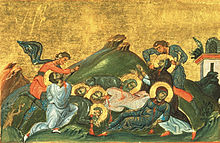
Back بيربيتوا القرطاجية ورفقاؤها Arabic Фелицитата и Перпетуя Bulgarian Perpètua i Felicitat Catalan Perpetua und Felicitas German Περπέτουα και Φιλικιτάτη Greek Perpetua kaj Feliĉita Esperanto Perpetua y Felicidad Spanish Perpetua eta Felizitas santuak Basque پرپتوآ و فلیسیتی Persian Perpétue et Félicité French
Perpetua and Felicity | |
|---|---|
 The martyrdom of Perpetua, Felicitas, Revocatus, Saturninus and Saturus from the Menologion of Basil II (c. AD 1000) | |
| Martyrs | |
| Born | c. 182 |
| Died | c. 203 (aged 20–21) Carthage, Roman province of Africa |
| Venerated in | |
| Canonized | Pre-congregation |
| Feast |
|
| Patronage |
|
Perpetua and Felicity (Latin: Perpetua et Felicitas; c. 182[6] – c. 203) were Christian martyrs of the third century. Vibia Perpetua was a recently married, well-educated noblewoman, said to have been 22 years old at the time of her death, and mother of an infant son she was nursing.[7] Felicity, a slave woman imprisoned with her and pregnant at the time, was martyred with her. They were put to death along with others at Carthage in the Roman province of Africa.
The Passion of Saints Perpetua and Felicity narrates their death. According to the narrative, five people were arrested and executed at the military games in celebration of the emperor Septimius Severus's birthday. Along with Felicity and Perpetua, these included two free men, Saturninus and Secundulus, and an enslaved man named Revocatus; all were catechumens or Christians being instructed in the faith but not yet baptized. To this group of five was added a further man named Saturus, who voluntarily went before the magistrate and proclaimed himself a Christian. Perpetua's first person narrative was published posthumously as part of the Passion.[8][9]
- ^ Holy Trinity Russian Orthodox Church
- ^ Great Synaxaristes: (in Greek) Ἡ Ἁγία Περπέτουα ἡ Μάρτυς καὶ οἱ σὺν αὐτῇ. 1 Φεβρουαρίου. ΜΕΓΑΣ ΣΥΝΑΞΑΡΙΣΤΗΣ.
- ^ Martyr Perpetua, a woman of Carthage. OCA – Feasts and Saints.
- ^ "The Calendar" (PDF). Church of England. Retrieved 11 March 2016.
- ^ Lutheran Woman Today, Volume 11. Publishing House of Evangelical Lutheran Church in America. 1998.
Perpetua is commemorated by the church on March 7.
- ^ Salisbury, Joyce Ellen (3 March 2019). "Perpetua: Christian Martyr". Encyclopædia Britannica. Retrieved 7 July 2019.
- ^ Cite error: The named reference
thesis_PERPETUA_DIARYwas invoked but never defined (see the help page). - ^ Heffernan, Thomas J. (2012). The passion of Perpetua and Felicity. Oxford: Oxford University Press. doi:10.1093/acprof:osobl/9780199777570.001.0001. ISBN 9780199777570.
- ^ Gold, Barbara K. (2018). Perpetua: athlete of god. Oxford: Oxford University Press. doi:10.1093/oso/9780195385458.001.0001. ISBN 9780195385458.